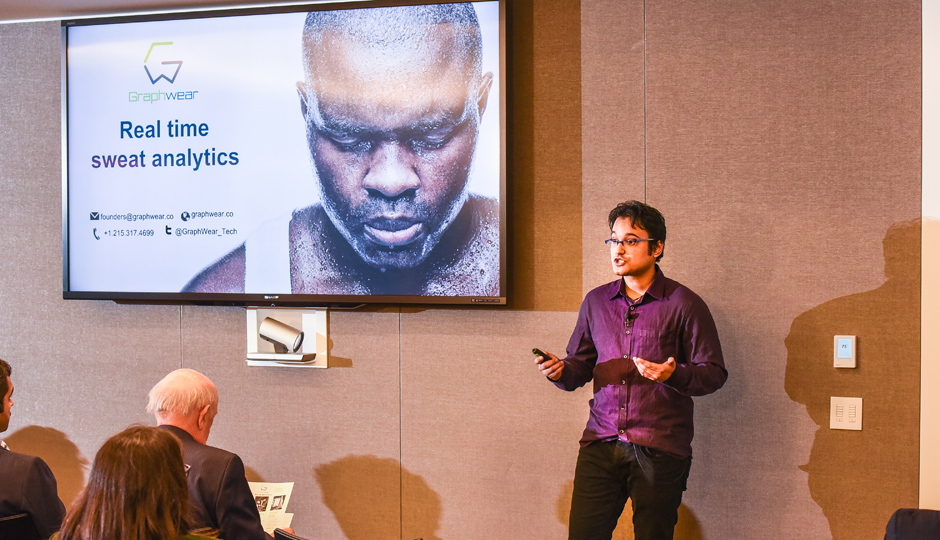DreamIt was Second-Most Active Health Care Investor in 2015

At a recent Dreamit health demo day, Saurabh Radhakrishnan introduces us to GraphWear, a smart sweat patch.
Whether it’s a mouthpiece that detects concussions, pill bottles that blink when it’s time for patients to take medicines or wearables that track diseases, health care technology is an exploding industry — and Philadelphia is at the center of it all.
In fact, Philly’s Dreamit Ventures (through its offshoot Dreamit Health) was the second-most active health care investor in 2015, according to new research from CB Insights. (No. 1 was the highly touted Silicon Valley-based seed accelerator, Y Combinator.) DreamIt and Y Combinator were the only investors to finance more than 10 unique digital health companies this past year — with DreamIt making deals with companies like Redox, Oncora Medical and CareCierge.
For 2016, Dreamit has $1 million earmarked for investments in health care tech. To date, Dreamit has invested more than $3.1 million in health care companies that have participated in its program and those companies have raised nearly $12.3 million in additional capital, the company reported.
Dreamit Health hopes to keep the momentum rolling into 2016. On Monday, the organization announced that it’s renewed annual partnerships with Penn Medicine and Independence Blue Cross. For the fourth year in a row, the two health care giants will work closely with Dreamit startups, providing commercial validation and feedback, serving as advisory board members, providing mentorship and opening their doors to meet with selected companies throughout Dreamit’s four-month accelerator program.
“We’re not just renewing our connection to Philadelphia as a hub for Dreamit but also healthcare as a vertical,” said Dreamit CEO Avi Savar in an interview on Monday.
Dreamit Health has also been having “conversations with other players in the region” and plans to announce smaller partnerships soon, said Savar.
Dreamit Ventures — the parent company — has recently announced a shift in strategy, retooling its program to cater to more experienced, seasoned entrepreneurs who are slightly later-stage and may have already raised capital and have a customer base. Traditionally, Dreamit has sought out pre-seed stage companies. For Dreamit Health, the shift means accepting more proven companies into its program — something that should please corporate partners like Penn Medicine and IBX who are looking to partner with businesses that are “more actionable sooner,” said Savar.
“These companies are slightly less risky. Their data points are proven, maybe they have revenue and a customer or two,” he said. “For those businesses, our $25,000 or $50,000 isn’t going to make a big difference but the access to our partners is really important.”
The result, he said, is that “later-stage companies will be able to engage with these brands in a more significant way.”
Like what you’re reading? Stay in touch with BizPhilly — here’s how:
- Follow BizPhilly on Twitter and follow editor Jared Shelly here.
- Get the BizPhilly Newsletter
- Like BizPhilly on Facebook
- Check out the BizPhilly homepage


